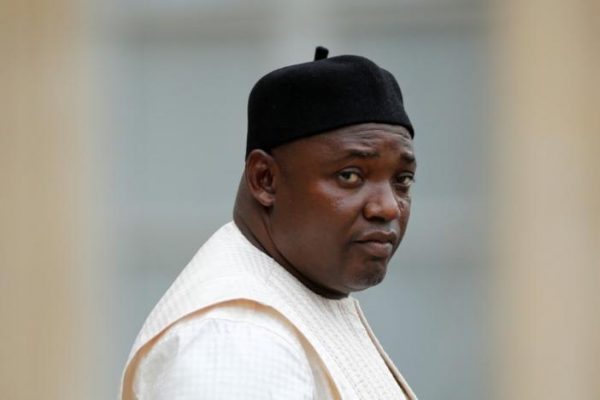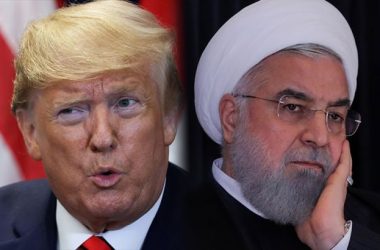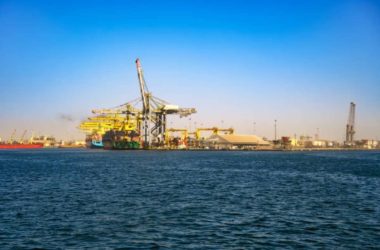
(JollofNews) – “Alongside providing people with safe drinking water and sanitation, my government, through the Ministry of Health, is scaling up its efforts to improve our health delivery systems, especially for women and children.
As a first step, we have obtained additional assets to support primary health care provision in the country. This includes 800 pedal bicycles and 29 motorbikes for Village Health Workers and Community Health Nurses across the country’s seven health regions.
I am pleased to report that the World Bank has approved US$7 million in additional funding for the Maternal and Child Health as well as the Nutrition Result Project. My government has also submitted a proposal to the EU to enhance food security. We would welcome their support to help us treat acute malnutrition and prevent all forms of under-nutrition.
With more than 95 percent coverage, we are also getting support from the Global Alliance for Vaccine Initiative (GAVI) to help us consolidate our strong track record on child immunizations. This project, estimated at US$4.6 million will help strengthen and enhance our immunization systems.” President Barrow, July 24, 2017.
A review of the president’s deliberation on health would conclude that it was entirely based on primary healthcare which fortunately has been the most active component of the Gambian health delivery systems since the first republic with both the secondary and tertiary remaining as strugglers.
How do we then as a nation improve the functions of the two other important components of the health system?
At a personal level and in consideration of the small size of our population, I will suggest an emulation of the National health Service (NHS) UK and in this, primary health care should be made free or next to free in order to make it readily available as a measure of preventing disease burden while maintaining it completely at Health Centre level.
Furthermore, all the regional hospitals including Bundung Maternal and child (formerly Jammeh Foundation) hospital be upgraded into proper general hospitals to provide affordable secondary care for each administrative region with Polyclinic serving as a secondary care service centre for Banjul.
And the Edward Francis Small Teaching Hospital and Serrekunda General Hospital can then be given full autonomy to be managed by their own independent administrations and as well upgraded as proper and well equipped tertiary hospitals for Medical & Surgical and Maternal & Child Care respectively.
However, the care at the tertiary level should be purely advanced specialist paid for services in order to meet their maintenance cost and most be made adequate and readily available by the respective hospitals.
This will help decongest both hospitals in terms of capacity needs and as well reduce the burden related to demand overriding supply which has always been the cause of deficit in services rendered at the tertiary level.
Moreover, to prevent the stagnation of the health personal (doctors and nurses) particularly doctors, the Medical and Dental council can restructure the internship program for graduates of the medical school into two phases; a one year 3 monthly rotation at the teaching hospitals and a year rotation at the regional hospitals.
This can come with three benefiting results;
1 – it will reduce the expenditure relating to increased staff capacity of the teaching hospitals thus creating funds for the improvement of other areas of the hospitals.
2 – it will improve performance by creating competition for those doctors/nurses that may want to return to the tertiary hospitals at the end of their regional hospital rotations.
3 – it will broaden and enrich the experience of those posted doctors and nurses.
How can we improve the human resource capacity to maintain the functionality of these systems?
It is commendable to say that the country has trained many doctors, nurses, public health officers and other cadres. However, in health, training without specialisation is synonymous to building a multipurpose house without furniture.
Hence the need to graduate the government’s concentration from undergraduate to postgraduate training with diversification of specialty for both doctors and nurses while creating attractive incentives for those abroad to return and contribute in the strengthening of the existing systems.
And to avoid brain drain, flexible bonds with as well incentives should be attached to postgraduate training grants which can be gained through bilateral and multilateral cooperations with countries like Nigeria, Turkey, India, Senegal, China etc thus instead of building a $50M conference centre or a $48M forensic lab for example, these funds can be used to train 10 -15 specialists whom in 5years upon their return can save the government more than the amount spent on their training.
It is therefore paramount for the government to work on redirecting its foreign aid policy from monetary to human resource development which will thus prevent the drainage of funds into unknown wells and as well reduce corruption.
Dr Muhammed Teks Tekanyi, USA






Healthcare is expensive and it is NOT free, a reality this administration will face sooner than later. The Gambia must use her meager resources to provide the best but affordable care for the people. Mr Barrow’s policy objectives should include:
1. Creation of primary and preventive clinics all over the country. The goal should be attaining 80 – 90% immunization compliance for all recommended child immunization. Nutrition education and support with milk and vitamin for poor families. Development of community outreach at the mosque and churches.
2. Aggressive policy for nationwide mosquito and pest control.
3. Provision of clean water to all communities.
To those who are wondering, it is impossible to develop a workable disease and prevention model in Subsahara Africa without clean water and malaria prevention.
4.Development and or reorganization of existing healthcare care education. Medical education, Nursing education , Pharmacy education and other support allied health education. Encourage investors to help build and develop this area with necessary government support and financial incentives. Taxes, land and other attractive inducements.
5. Encourage investors to take over and run all existing hospitals. Invite and encourage investors to compete with each other for secondary and tertiary healthcare delivery facility and services.
6. Develop policy that will allow business to sell healthcare insurance to Gambians in the diaspora for loved ones in Gambia.
7. Develop a tourism healthcare policy that will encourage investors to build and promote European tourist to have specific healthcare services delivered in Gambia. It will be cheaper for the patient and provide needed foreign currency.
8. Consider removing taxes on healthcare services now, to be reevaluated at intervals.
9. Develop and empower a medical board to license and discipline Physician and Nurses to ensure best standards and monitoring of continued health education.
10. Put healthcare policy and planning in the hands of those who have the training, skill set and experience to develop a workable plan. For example, Gambian Physician who have served on Boards of Licensure and Discipline in Europe and USA should be asked to help develop our program. Not politicians or local doctors that are clueless. Or develop strategic alliance with States and countries in USA or Europe for a joint Board. This is the most important civil rights issue facing our country today.
11. Make healthcare policy and objectives transparent.
I am sure Mr Barrow is aware of the challenges, his public statements seems to suggest a dedication to task. The issue will be where will the money come from, and even if we get some of it, how does the Government make sure the resources are not wasted.
It is an awesome responsibility. I don’t envy Barrow.
God Bless The Gambia.
acute malnutrition and prevent all forms of under-nutrition comes from having poor soils, and a fisheries policy of selling all our good, nutritious fish overseas, coupled with a dependency on imported poor quality whitened rice (whitened with tapioca) much of which is simply tap sugar – read diabetic forming. ie more “money” per se will not fight mal-nutrition or under-nutrition, since both these point to lack of essential mineral in our soils, caused by over farming for exports (for every ton of ground-nut exported, we export with it up to seven tons of top soil – clearly an unsustainable equation- ,over grazing, deforestation, bush fires, and other unsustainable land use – witness the irresponsible conversion of the rice field around Bakau into residential properties, or the turn of the Yarambaba (Yarambaba means peaceful valley) forest, or bushland, again, into residential building, and similar environmental vandalism, including the thoughtless, and willy nilly issuing of fishing licence to foreign fishing ventures, and you will come to realise the sources all malnutrition, and undernutrition plaguing the Gambia today. Prime farming, and forestry land being turned to dust – at least that is how the next generation, or the one following, or the one after that will come to see it.
So money per se will not do. What is needed is real hard nosed policies geared towards uplifting and properly maintaining our natural heritage, challenge and reverse soil and environmental degradation. We could start by imposing annual levies on all properties built in formally preserved bush land and recycle the proceeds back into the challenge of reversing the environmental damage caused – upwards to 65% of the property value will discourage any further encroachments. Abolish fishing quotas, as they only encourage fishers to discard, upwards to 100 smaller fish to die in order to catch that one big one that commands a higher price in the market, and buy back all fishing licence to cooperatives who, because their members as ordinary citizen have a continued stake in the health of our oceans, are more likely to fish sustainably. Put a price on all plastic and bottle containers, one dalasi say, and provide enough incentives for recycling rubbish, and turn all organic waste into soils, mature, etc. Buy back, or lease marginal land and turn it into bushland and encourage, and harvest the tall grass and turn it into animal feed. Creating a market in animal feed, together with actively creating bush corridors around villages will go a long way in discouraging bush fires, as market participants take on the role of incentivising, policing and educating locals on the hazards of lighting them, or on the strategy of containing them. In fact there should be fire fighter dedicated to fighting bush fires – not just around the cities but all over the country.
The message is by caring for our natural heritage, we are capable of growing the economy by a few percentage points every year as people come up with innovative ways of caring for the environment.
But real hard, and uncompromising environmental policies are needed as a spur for people to invest the time, thought and money into preserving our soils, forests, fishing ground, and natural heritage that the next generation can be proud of, and to stem the completely debilitating condition of mal, and undernutrition. And as Madi Jobarteh would say: Adama Barrow bless Gambia with sound workable environmental policy that are fit-for-purpose, easy to understand, engaging, and enabling, so everyone to make some positive contribution towards fighting off the menaces malnutrition – even if it is simply not lighting fires, or not building houses in preserved bush land or forested land, or leasing that marginal piece of land for 5 to 10 years to the department of forestry for bushland development , or paying increased taxes to enable the government to buy back fishing licences and reissuing them to cooperative organisations, and so on.